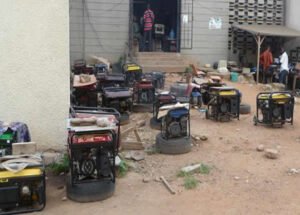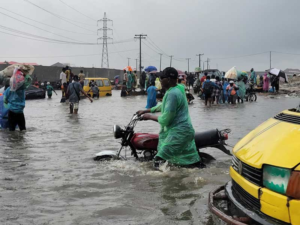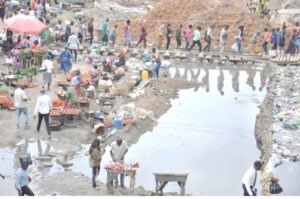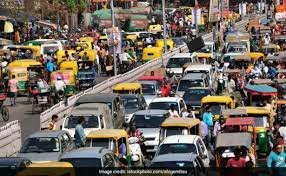Lagos, Nigeria’s economic hub and one of the world’s fastest-growing megacities, is grappling with a severe environmental crisis. Poor air quality, inadequate waste management, and failing sanitation systems have resulted in widespread pollution. Residents frequently complain of the city’s unpleasant smell, blocked drainage systems, and deteriorating hygiene standards. This report, by Juliet Jacob analyses these concerns about environmental problems and seeks offer solutions.


The Smell of Lagos: Public Perception vs. Reality
Many Lagosians have expressed concerns about the city’s distinct and often overwhelming odour. Poor sanitation, ineffective waste management, and irritating air pollution are major contributors to this issue.
Recently, Ushie Uguamaye, a National Youth Service Corps (NYSC) member known online as Raye, went viral after stating that “Lagos is smelling.” Her statement though blunt but highlighted the pressing environmental issues facing the city.

Even the city’s most affluent neighbourhoods are not spared. Banana Island, a symbol of luxury and exclusivity, has suffered from severe flooding due to blocked drainage systems. A resident lamented:
“After heavy rainfall, the stench and flooding make you question what makes Banana Island so ‘affluent.”


Lagos State Governor, Babajide Sanwo-Olu, stressing a Point that the state is compliant to Environmental best practices contrary to reports
Air Pollution: The Silent Killer
Lagos’ rapid urbanization has significantly worsened air pollution challenges. A World Bank study, The Cost of Air Pollution in Lagos, estimates that air pollution-related illnesses and deaths resulted in economic losses of $2.1 billion in 2018—about 2.1% of Lagos State’s GDP. The same year, approximately 11,200 premature deaths were recorded due to air pollution, the highest in West Africa.


Major Causes of Air Pollution
Road Transport: Lagos has the world’s longest average commute time (four hours per day). With 227 vehicles clogging each kilometer of road daily, most over 15 years old and running on high-sulfur fuel, toxic pollutants are a major issue.
Industrial Emissions: Industrial zones like Apapa, Idumota, Ikeja, and Odogunyan have extreme pollution levels. Odogunyan, known for iron smelting, recorded PM2.5 levels 70 times higher than WHO guidelines.
Generator Emissions: About 50% of Lagos’ energy demand is met by diesel generators, widely used in businesses and households, contributing to toxic air pollution.
Waste Management Deficiencies: Open burning of waste and illegal dumping release harmful toxins into the air.
Port Operations and Heavy-Duty Vehicles: Lagos’ two major ports, Apapa and Tin Can, see 5,000 high-emission diesel trucks operating daily.
Health Impacts of Air Pollution
Lagos residents face dangerously high levels of fine particulate matter (PM2.5), a major air pollutant that can penetrate the bloodstream and trigger severe health conditions such as respiratory infections, heart disease, lung cancer, and chronic obstructive pulmonary disease (COPD). According to the World Health Organization (WHO), Lagos’ PM2.5 levels are 68 μg/m³—far exceeding the recommended 10 μg/m³ annual mean concentration.
Blocked Drainages: A Persistent Crisis
Clogged drainage systems are a major contributor to Lagos’ environmental crisis. At the onset of the rainy season, nearly every part of the state experiences severe flooding, turning streets into rivers of filth and debris. An environmental activist in Surulere warned:
“Lagos’ drainage system is a ticking time bomb. People dump refuse into gutters, and the government does little to enforce proper waste disposal.”
Residents also play a role in this crisis. Indiscriminate waste dumping worsens the problem, leading to repeated cycles of flooding and sanitation failures.
How Lagos Residents Share in the Blames
Residents of Lagos contribute to air pollution in several ways, mainly due to urbanization, transportation habits, and waste disposal practices.
Vehicle Emissions – Lagos has one of the highest numbers of vehicles in Nigeria, with many being old and poorly maintained. These vehicles release high levels of carbon monoxide, nitrogen oxides, and particulate matter, worsening air quality.
Generator Fumes – Due to frequent power outages, many residents rely on petrol and diesel generators, which emit carbon monoxide, sulfur dioxide, and other harmful pollutants.
Open Burning of Waste – Many Lagosians burn their waste, including plastics and organic materials, releasing toxic substances like dioxins and furans into the air.
Industrial Activities – Residents working in or living near factories and small-scale industries are exposed to emissions from power plants, refineries, and chemical plants, which release pollutants such as sulfur dioxide and heavy metals.
Cooking with Biomass Fuels – Many households, especially in low-income areas, use firewood, charcoal, or kerosene for cooking, producing indoor and outdoor air pollution.
Traffic Congestion – The frequent traffic jams in Lagos lead to prolonged idling of vehicles, increasing emissions and worsening air quality.
Construction Activities – Dust from construction sites, roadworks, and unpaved roads contributes to particulate matter pollution, affecting respiratory health.
Marine and Waterway Pollution – Emissions from boats and ferries operating on Lagos waterways also contribute to air pollution, especially in coastal communities.
Government Interventions and Policy Measures
The Lagos State Environmental Protection Agency (LASEPA) has introduced several initiatives, including:
The Lagos PMEH/Air Quality Management Program: Identifies pollution sources and recommends solutions.
The Clean-Air Forum: Gathers experts to discuss actionable steps for improving air quality.
Fuel Regulation Reforms: Reducing sulfur content in diesel and gasoline.
Plans to Transition from Diesel Generators to Alternative Energy Sources.
Proposed Investments in Waste Management Infrastructure.
The Lagos Waste Management Authority (LAWMA) has intensified its enforcement and clean-up operations across the state to curb indiscriminate waste disposal and promote environmental sustainability. The agency is also enhancing the cleanup of Lagos waterways to reduce pollution and maintain cleaner water channels.
Expert Insights
Mr. Ikechukwu Mozie, an environmental and waste management consultant, highlighted in an interview with African Health Reports that air pollution is a serious health crisis in Nigeria, particularly in Lagos.
He said, “Air pollution in Nigeria and in Lagos is mainly caused by indiscriminate waste disposal. When wastes are not properly managed, grave dangers are in the offing.”
Mozie emphasized the dire state of sanitation in Lagos: “On the outskirts of Lagos and on the expressway, where people defecate openly in the bush and in gutters, it is not healthy. When rain comes and washes those dumps into vital sources of drinking water, it can cause serious illnesses.”
He also criticized the lack of enforcement of environmental laws, stating that if waste is properly managed, it can be recycled into useful by-products that generate revenue.
The Way Forward: Possible Solutions
Experts suggest a multi-pronged approach to combating pollution in Lagos: these include,
Adoption of Low-Emission Vehicles and Cleaner Fuel Policies. Expansion of Public Transportation Networks. Strengthening Industrial Emission Controls.
Investment in Waste Management Solutions. Implementation of Stricter Environmental Laws, and Enhanced Air Quality Monitoring Systems and Public Awareness Campaigns.
Health experts warn that air pollution is an often-overlooked risk factor for noncommunicable diseases (NCDs). According to WHO estimates, it contributes to 24% of all adult deaths from heart disease, 29% from lung cancer, 25% from stroke, and 43% from COPD.
Conclusion
Lagos is on track to become the world’s largest city by 2100, making pollution control a critical issue. While some progress has been made, challenges remain in policy enforcement and infrastructure development. A cleaner Lagos requires collaboration between the government, private sector, and residents to implement long-term solutions. If swift action is not taken, the lingering stench and environmental degradation may define Lagos’ future instead of its promise as a thriving megacity.



